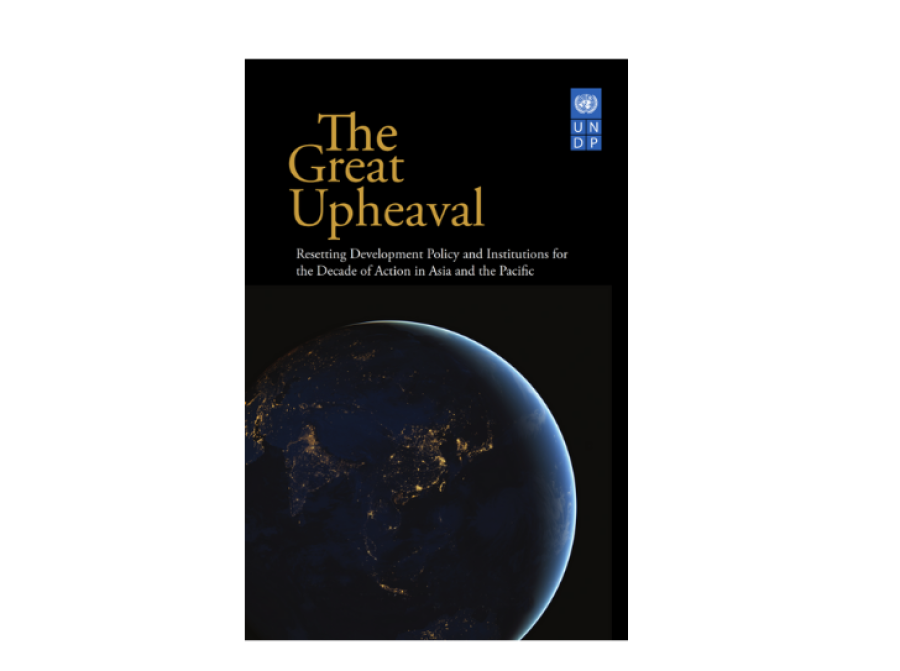Books
The Great Upheaval: Navigating the post-pandemic world in Asia-Pacific
Today, policymakers in the region are urged to rethink development strategies, prioritise investments in human capital, and foster regional and global cooperation.
Khim Lal Devkota
The Great Upheaval, edited by Swarnim Waglé and Kanni Wignaraja, was published by the United Nations Development Programme (UNDP) in 2022. It offers an in-depth analysis of the socio-economic and environmental challenges confronting the Asia-Pacific region in the aftermath of the Covid-19 pandemic.
This compilation draws from diverse authors to assess the region’s response to the pandemic. It proposes pathways for sustainable recovery and growth and presents innovative policies and strategies essential for long-term development.
At the dawn of the 21st century, Asia achieved a remarkable feat by lifting one billion people out of poverty within a single generation. However, this progress was abruptly halted by the Covid-19 pandemic, which exposed and exacerbated existing vulnerabilities across the region.
The authors of this volume critically examine the Asia-Pacific response to the pandemic while identifying crucial areas that require reform to facilitate effective rebound and sustained growth.
The book is structured into thirteen chapters, each addressing critical aspects of development policy and institutional reform necessary for the region’s recovery and long-term sustainability.
A central argument is needed to reimagine development policies and institutions to foster resilience, sustainability, and inclusivity. Key themes explored include integrating climate action with economic policies, enhancing digital connectivity, restructuring global value chains, and promoting regional cooperation.
The book emphasises the urgency of bolstering investments in universal public health, education, and social protection to enhance human capabilities and ensure equitable development.
Authors advocate revitalising production methods and networks to promote sustainable growth, underscoring the importance of leveraging global public goods to address emerging digital and climatic challenges.
With the Asia-Pacific region home to three-fifths of the world's population and accounting for nearly half of global output, the book projects that 2050, despite historical setbacks and pandemics, the region is poised to reclaim its role as a leading economic and social force.
However, it stresses that economic strength alone will not suffice; inclusion, resilience, and sustainability are now imperative for planetary well-being.
The book serves as a vital resource for policymakers, development practitioners, and stakeholders, offering actionable insights and strategies for navigating the complexities of the post-pandemic world and fostering a more inclusive, resilient, and sustainable Asia-Pacific region.
It explores the Asia-Pacific region’s response to the pandemic and identifies areas requiring reform to achieve a robust recovery. Authors present innovative perspectives on social and economic strategies, aiming to guide policymakers and practitioners in navigating the complexities of post-pandemic recovery.
They emphasise revitalising production methods and networks as essential for sustainable growth, advocating increased investments in universal public health, education, and social protection to enhance human capabilities.
Despite the pandemic’s profound impact—disrupting global supply chains, causing significant job losses, and exacerbating inequalities—the region's response varied widely.
Some countries more effectively contained the virus and mitigated economic damage than others, underscoring the critical need for enhanced regional cooperation and resilient health and social protection systems.
The authors highlight the imperative of bolstering investments in universal public health, education, and social protection as fundamental for immediate recovery and building long-term resilience against future crises.
For instance, Manuel F Montes advocates aligning sovereign debt financing with climate action to address escalating climate risks and integrating climate considerations into fiscal policies to promote economic recovery and climate resilience simultaneously.
Paul Garnett addresses the persistent digital divide in the region, where disparities in broadband access hinder economic participation and social development. He proposes strategies for expanding digital infrastructure, reducing costs, and promoting digital literacy to harness digital technologies for innovation, productivity, and economic growth.
Jose Gabriel Palma and Jonathan Pincus explore the risk of countries in the Asia-Pacific region falling into the middle-income trap. They advocate for structural transformation, particularly in the manufacturing sector.
They stress policies that promote industrial diversification, technological upgrading, and higher value-added production to avoid overreliance on low-cost labour and commodity exports.
AK Shiva Kumar discusses human security and its relevance in a post-Covid-19 context, emphasising comprehensive approaches to addressing root causes of insecurity such as poverty, inequality, and inadequate access to essential services.
Inge Kaul underscores the need for international cooperation in providing global public goods to effectively tackle transnational challenges like pandemics, climate change, and digital governance.
Khalil Hamdani examines the potential of enhanced regional cooperation in the post-Covid-19 era, highlighting the importance of regional institutions in coordinating responses to health crises, economic shocks, and environmental threats.
Sakiko Fukuda-Parr and Sanjay G Reddy provide valuable policy lessons, highlighting governance, human development, and flexibility in policy design and implementation as crucial for effective response and recovery.
‘The Great Upheaval’ envisions a new Asia-Pacific century where economic strength is complemented by inclusion, resilience, and sustainability. As the region navigates the post-pandemic landscape, policymakers are urged to rethink development strategies, prioritise investments in human capital, and foster regional and global cooperation.
By embracing these principles, the Asia-Pacific region can not only recover from the current crisis but also build a more prosperous, equitable, and sustainable future.
The insights from ‘The Great Upheaval’ are particularly relevant for Nepal, given its challenges with climate change, digital connectivity, and economic stability.
Aligning sovereign debt with climate action, improving digital infrastructure, and fostering regional cooperation are critical strategies for Nepal to navigate the post-pandemic landscape and achieve sustainable development.
The book offers actionable insights and recommendations. Nepal can enhance its resilience, promote inclusive growth, and contribute to regional stability and prosperity by adopting the recommended policies and strategies.
The Great Upheaval
Year: 2022
Publisher: UNDP




 13.03°C Kathmandu
13.03°C Kathmandu










